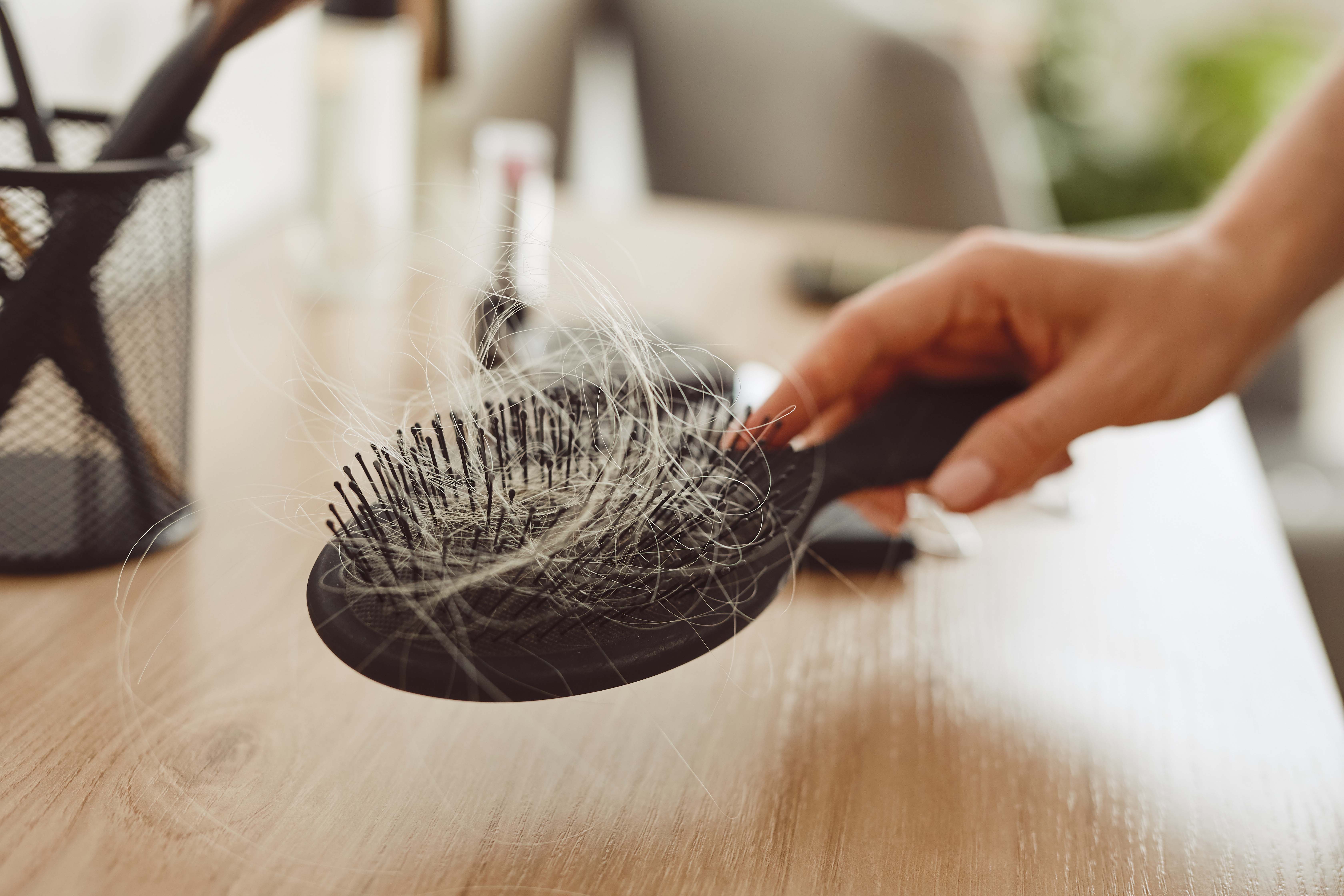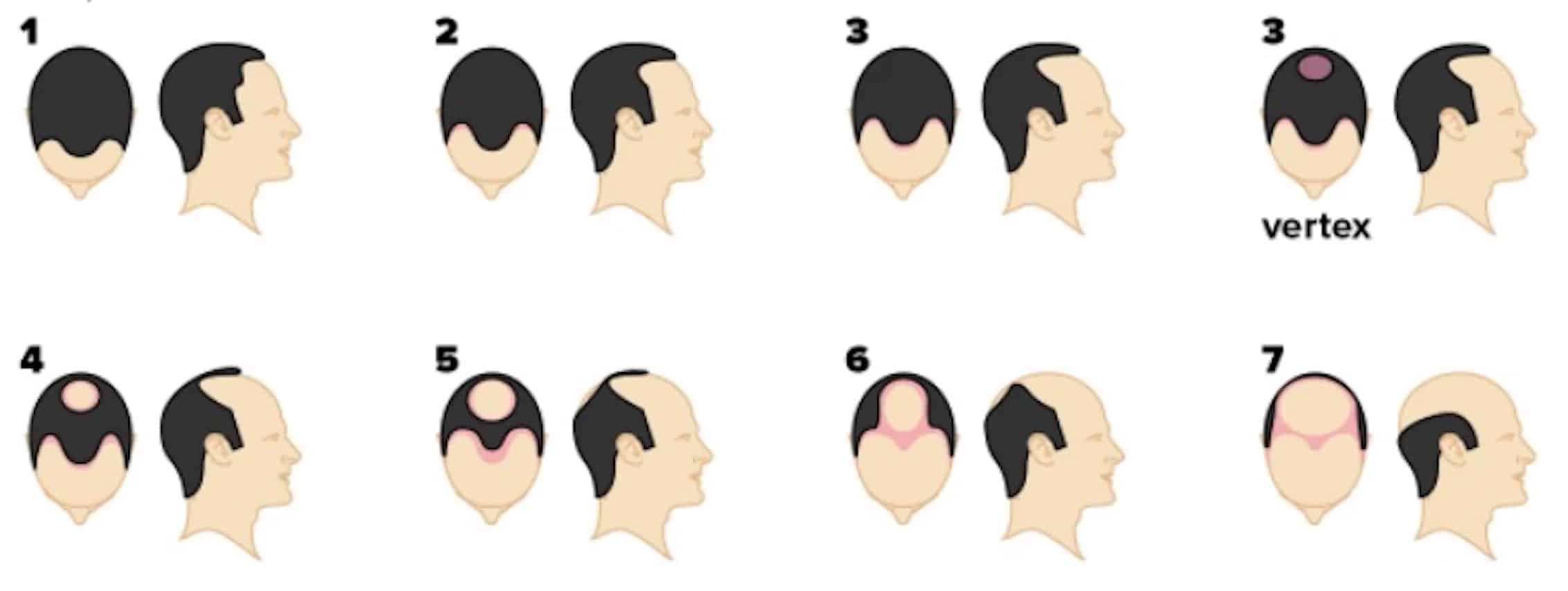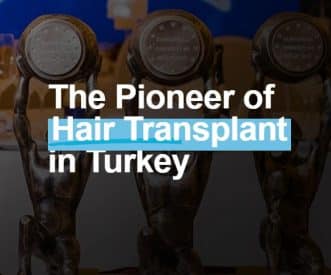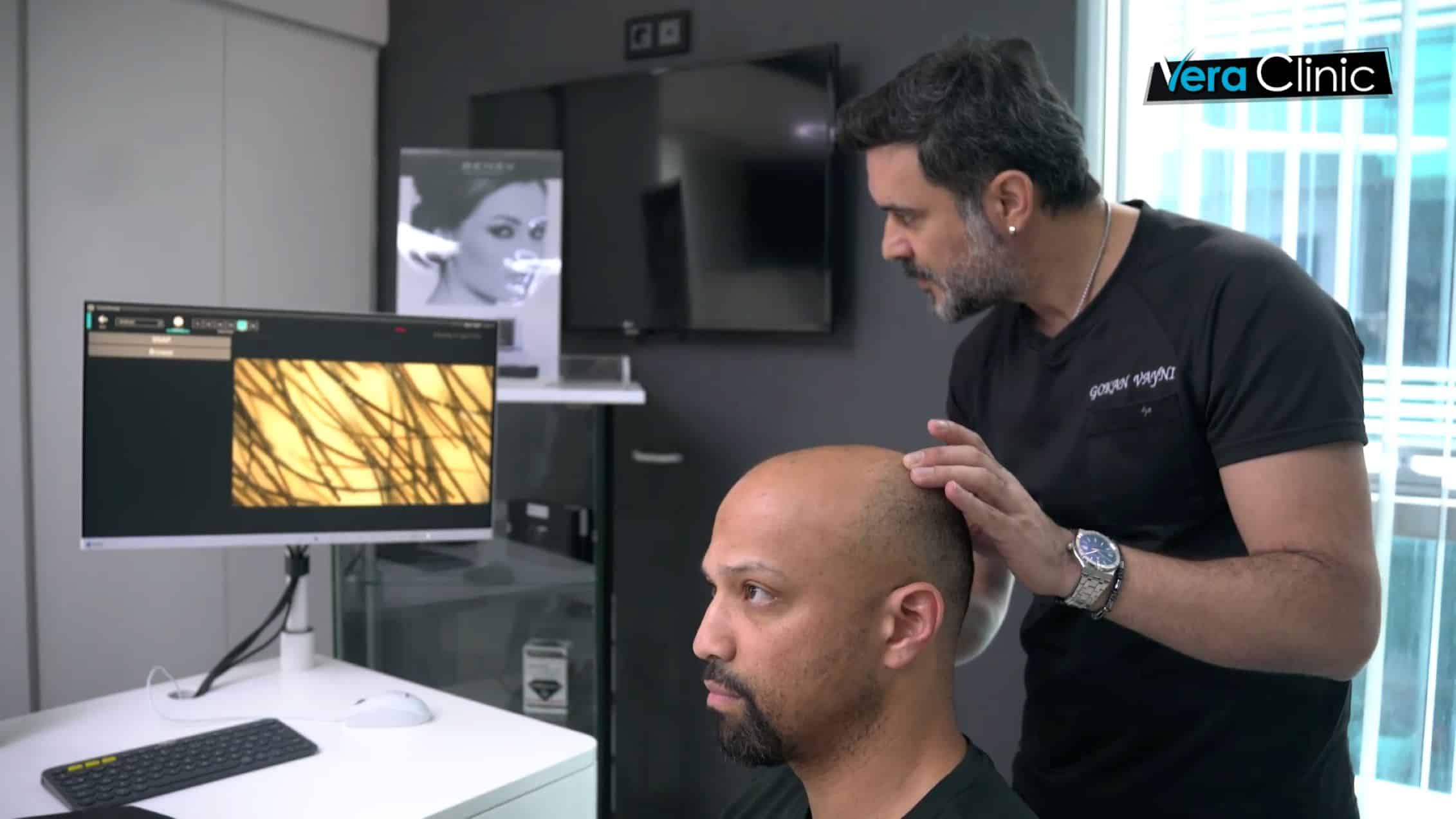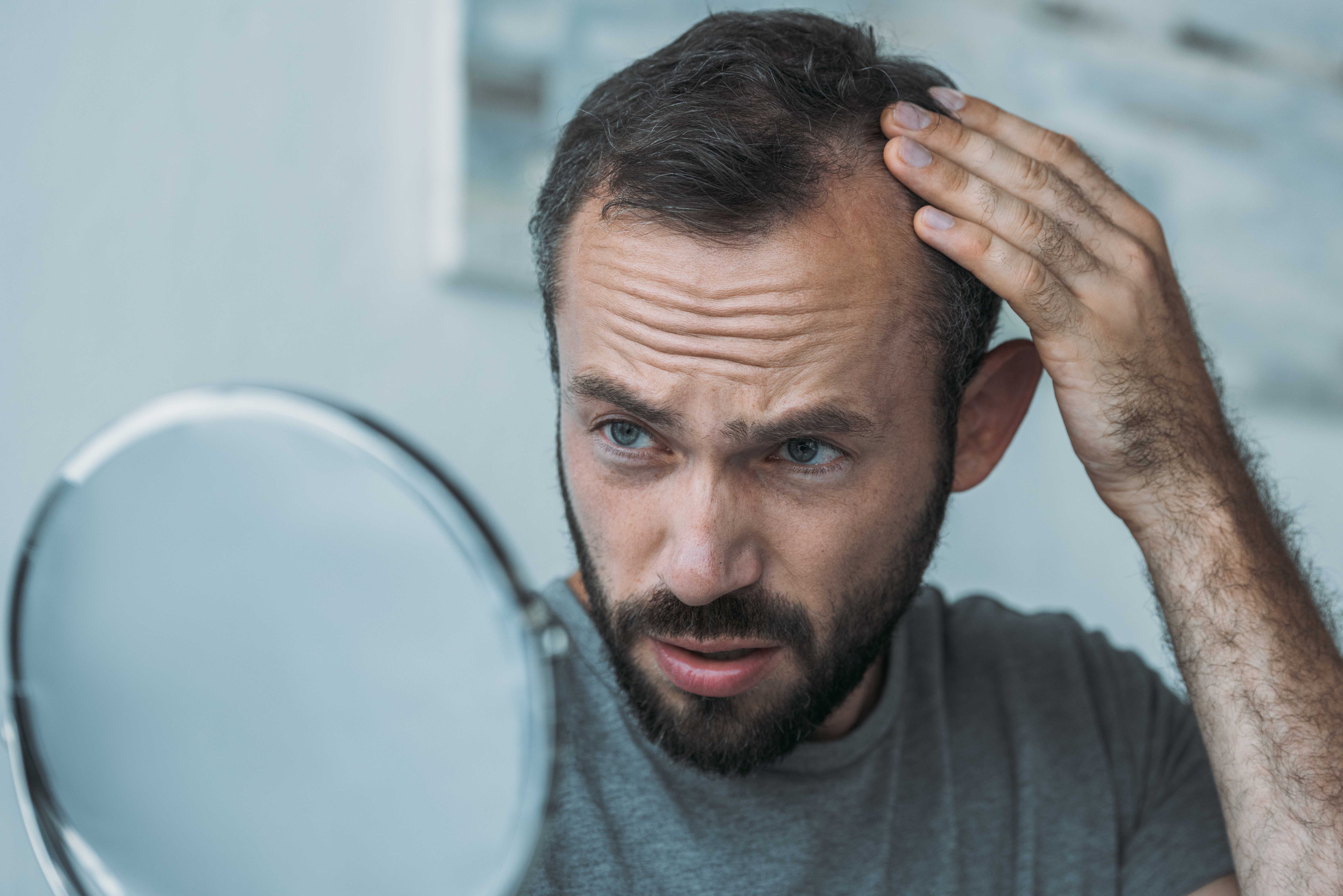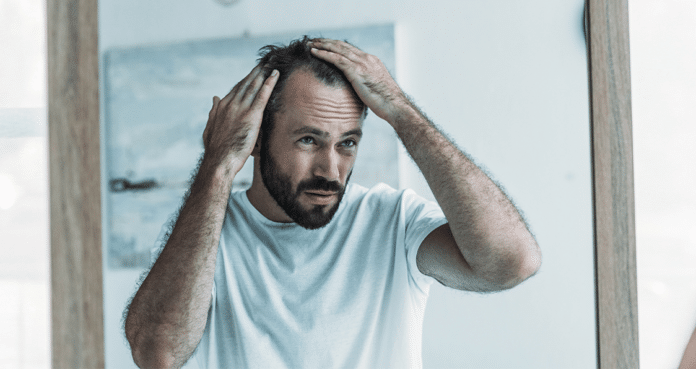
Is stress causing you to go bald?
Hair loss is a common concern for many people, and the role of stress in hair loss has gained significant attention in recent years. Stress is a natural response to various external and internal pressures, but when it becomes chronic and overwhelming, it can have negative effects on our overall health, including our hair. This blog explores the relationship between stress and hair loss, delving into the different types of stress-induced hair loss and how it affects our hair growth cycle.
It is important to note that not all hair loss is caused by stress, but extreme stress can contribute to significant hair shedding. Understanding the connection between stress and hair loss can help individuals identify the underlying causes of their hair loss and explore possible treatment options. By managing stress and implementing lifestyle changes, it is possible to minimize the impact of stress on hair health and promote regrowth.
Let’s dive in.
Understanding Hair Loss and Stress
Hair loss occurs when the normal hair growth cycle is disrupted. The hair growth cycle consists of three phases: anagen, catagen, and telogen. During the anagen phase, hair actively grows from the hair follicles. The catagen phase is a transitional stage where the hair follicle regresses. Finally, the telogen phase is a resting phase where the hair follicle is dormant and no hair growth occurs.
Chronic stress can disrupt the hair growth cycle by prolonging the telogen phase, leading to a higher number of hairs in the resting phase and a decrease in hair regrowth. This disruption can result in increased hair shedding and thinning. The prolonged exposure to stress hormones can also affect the health of the hair follicles, making them more susceptible to damage and hair loss.
The Science Behind Hair Loss
The hair growth cycle is regulated by a complex interplay of various factors, including stem cells and dermal papilla. Stem cells located in the hair follicles drive the hair cycle, replenishing and regenerating the hair shafts. These stem cells are supported by the dermal papilla, a cluster of specialized cells located at the base of the hair follicle.
In cases of chronic stress, the prolonged exposure to stress hormones, such as cortisol and corticotropin-releasing hormones, can disrupt the communication between the dermal papilla and hair follicle stem cells. This disruption hinders the activation and growth of the hair follicle stem cells, leading to a prolonged resting phase (telogen) and reduced hair regrowth. Additionally, chronic stress can induce inflammation in or around the hair follicles, further contributing to hair loss.
Understanding the science behind hair loss helps us grasp the intricate relationship between stress and hair health. By targeting these underlying mechanisms, it is possible to develop effective strategies for managing stress-induced hair loss.
How Stress Affects Your Hair Growth Cycle
Stress can have a profound impact on the hair growth cycle. The adrenal glands, located on top of the kidneys, play a crucial role in the body’s response to stress. They produce stress hormones, including cortisol, which can influence various physiological processes, including hair growth.
During periods of chronic stress, the adrenal glands may overproduce stress hormones, leading to an extended resting phase (telogen) of the hair growth cycle. This means that more hairs are in the resting phase, resulting in increased hair shedding and thinning. The extended resting phase also hinders the activation of hair follicle stem cells, further impeding hair regrowth.
It is important to note that while stress can contribute to hair loss, it is not the sole factor. Genetic predispositions, underlying medical conditions, and other lifestyle factors can also play a role. By managing stress and implementing healthy lifestyle habits, individuals can minimize the impact of stress on their hair growth cycle and overall hair health.
Types of Stress-Induced Hair Loss
Stress can manifest in different types of hair loss, each with its own unique characteristics.
Telogen Effluvium
Telogen effluvium is characterized by excessive shedding of resting (telogen) hair. Normally, around 85% of the hair on a person’s scalp is in the active growth phase (anagen), while the remaining 15% is in the resting phase. However, in cases of telogen effluvium, stressors induce a higher percentage of hairs to enter the telogen phase, leading to increased hair shedding.
Common stressors that can trigger telogen effluvium include excessive weight loss, giving birth, major life stressors (such as job loss or divorce), high fever, and recovering from an illness. It can also be induced by systemic diseases, major surgeries, certain medications, and nutritional deficiencies.
Telogen effluvium usually occurs around three months after the stressor and is self-limiting, lasting for about six months. However, in some cases, chronic telogen effluvium can persist for more than six months. With proper management and addressing the underlying stressors, hair regrowth can occur.
Alopecia Areata
Alopecia areata is an autoimmune condition in which the body’s immune system mistakenly attacks the hair follicles. This attack forces the affected hair follicles into the catagen phase, leading to hair loss. Unlike telogen effluvium, alopecia areata results in patchy hair loss rather than overall thinning.
The exact cause of alopecia areata is still unknown, but it is believed to be a combination of genetic and environmental factors. Stress is considered one of the environmental triggers that can contribute to the development of alopecia areata. It can affect not only the scalp but also other parts of the body, leading to the loss of eyebrows and body hair.
Managing alopecia areata often involves a multidisciplinary approach, including dermatological treatments and addressing underlying stressors. Topical corticosteroids are commonly prescribed as the first-line treatment, and in severe cases, topical immunotherapy or corticosteroid injections may be recommended. It is essential to consult with a healthcare provider to determine the most appropriate treatment plan.
Trichotillomania
Trichotillomania is a hair-pulling disorder characterized by recurrent and irresistible urges to pull out one’s hair. It is often associated with psychological factors, including stress and anxiety. Individuals with trichotillomania may engage in hair pulling as a coping mechanism to relieve tension or as a way to gain a sense of control.
The exact cause of trichotillomania remains unknown, but there is evidence to suggest a genetic predisposition and a link to stressful life events. The psychological impact of trichotillomania can be significant, leading to feelings of shame, embarrassment, and low self-esteem.
Treating trichotillomania involves a combination of behavioral therapies and addressing underlying stressors. Habit reversal training, a form of cognitive-behavioral therapy, helps individuals identify the triggers and behaviors associated with hair pulling and develop healthier coping mechanisms. Seeking support from mental health professionals can also be beneficial in managing the psychological aspects of trichotillomania.
Identifying Stress-Related Hair Loss
Identifying stress-related hair loss requires recognizing the symptoms and understanding the different types of hair loss associated with stress. Common symptoms include increased hair shedding, thinning hair, and changes in the hair growth cycle.
Telogen effluvium, alopecia areata, and trichotillomania are the three main types of stress-induced hair loss. It is crucial to distinguish between them to determine the appropriate treatment strategies. Chronic telogen effluvium, in particular, is characterized by hair shedding that lasts for more than six months. By monitoring these symptoms and seeking medical advice, individuals can take proactive steps to manage stress-related hair loss effectively.
Symptoms to Watch For
Recognizing the symptoms of stress-related hair loss is essential in identifying the underlying causes and seeking appropriate treatment. Common symptoms include increased hair shedding, hair thinning, and changes in the hair growth cycle.
Acute telogen effluvium is characterized by sudden and excessive hair shedding, usually triggered by a specific stressor. This type of hair loss often resolves on its own once the underlying stressor is addressed or treated. However, chronic telogen effluvium is hair shedding that lasts for more than six months and may require targeted management.
Monitoring the health of one’s hair and paying attention to changes in hair density, texture, and overall appearance can help individuals identify stress-related hair loss and take proactive steps to manage it effectively.
Comparing Stress-Related Hair Loss to Other Types
It is important to differentiate stress-related hair loss from other types of hair loss to determine the most appropriate treatment strategies. Androgenetic alopecia, also known as male or female pattern baldness, is a hereditary condition that results in gradual hair thinning and loss. Unlike stress-related hair loss, androgenetic alopecia is not directly caused by stress and has a different pattern of hair loss.
Understanding the specific type of hair loss is crucial in determining the most effective treatment options. While stress-related hair loss can be managed by addressing the underlying stressors and promoting a healthy hair growth cycle, androgenetic alopecia may require targeted interventions such as medications or hair transplant procedures. Consulting with a healthcare provider can help individuals navigate the complexities of different types of hair loss and develop personalized treatment plans.
Managing and Treating Stress-Induced Hair Loss
Managing and treating stress-induced hair loss involves a multifaceted approach that addresses both the underlying stressors and the health of the hair. By implementing stress management techniques and adopting healthy lifestyle habits, individuals can minimize the impact of stress on their hair growth cycle.
Professional treatments for stress-induced hair loss may include hair follicle regeneration therapies and topical corticosteroids. These treatments aim to promote hair regrowth and improve the overall health of the hair follicles. In addition to professional treatments, individuals can also explore home remedies and lifestyle changes that support stress management and promote healthy hair.
Professional Treatments for Recovery
Professional treatments for stress-induced hair loss focus on promoting hair follicle regeneration and reducing inflammation. Hair follicle regeneration therapies aim to stimulate the dormant hair follicle stem cells and reactivate the hair growth cycle. These treatments can include platelet-rich plasma (PRP) therapy, microneedling, and laser therapy.
Topical corticosteroids are also commonly prescribed for stress-induced hair loss. These medications help reduce inflammation in the hair follicles and promote hair regrowth. They are usually applied directly to the scalp and can be effective in managing conditions such as alopecia areata and telogen effluvium.
It is important to consult with a healthcare provider or dermatologist to determine the most appropriate treatment options based on the specific type and severity of stress-induced hair loss.
Or, you can find a hair transplant clinic such as Vera Clinic.
Vera Clinic
Vera Clinic has been providing hair transplant operations for a decade and is staffed with the best hair transplant doctors in Turkey. The Clinic has been on the rise, being the best hair transplant clinic in Turkey since it was established.
At Vera Clinic, hair transplant procedures have the power to completely transform the appearance of individuals with hair loss. The before and after results of their hair transplant procedures are truly incredible, showcasing the restoration of a full head of hair and natural hairline, really restoring confidence and giving someone their life back. The skilled team of experts at Vera Clinic understands the specific goals and expectations of each patient, tailoring the procedures to deliver optimal results.
Check out this awesome hair transplant clinic today.
Home Remedies and Lifestyle Changes
In addition to professional treatments, individuals can incorporate home remedies and lifestyle changes to manage stress-induced hair loss. These approaches focus on reducing stress levels and promoting overall hair health.
Home remedies for stress-induced hair loss can include scalp massages to improve blood circulation, using essential oils known for promoting hair growth, and gentle hair care practices that minimize damage. Lifestyle changes such as regular exercise, getting adequate sleep, practicing stress management techniques like meditation or yoga, and maintaining a balanced diet rich in vitamins and minerals can also contribute to healthy hair growth.
It is important to note that while home remedies and lifestyle changes can support hair health, they may not be sufficient as standalone treatments for severe cases of stress-induced hair loss. Consulting with a healthcare provider or dermatologist can provide personalized guidance on the most effective combination of professional treatments and lifestyle changes for managing stress-induced hair loss.
Importance of a Balanced Diet
A balanced diet plays a crucial role in maintaining hair health and preventing stress-related hair loss. A diet rich in essential nutrients promotes hair growth and strengthens the hair follicles. Protein is particularly important for hair health, as hair strands are composed of a protein called keratin. Consuming enough protein helps support the growth and regeneration of hair follicles.
In addition to protein, vitamins and minerals such as vitamin A, vitamin E, biotin, iron, and zinc are essential for healthy hair. These nutrients contribute to the production of sebum, the natural oil that moisturizes the scalp and keeps hair strands hydrated. They also support the hair growth cycle and help prevent hair breakage and shedding.
Incorporating foods like lean meats, fish, eggs, nuts, seeds, fruits, vegetables, and whole grains into your diet can provide the necessary nutrients for maintaining healthy hair. Consulting with a healthcare professional or a registered dietitian can help ensure that your diet is balanced and tailored to your specific needs for optimal hair health.
Preventive Measures Against Stress-Related Hair Loss
Taking preventive measures against stress-related hair loss is essential for maintaining healthy hair and minimizing the impact of stress on hair follicles. Effective stress management techniques can help reduce stress levels, which in turn can reduce hair loss. Engaging in activities such as meditation, deep breathing exercises, yoga, and regular physical exercise can help manage stress and promote overall well-being.
In addition to stress management techniques, proper hair care is crucial for preventing hair loss. Avoiding harsh styling treatments, excessive heat, and chemical products can help minimize damage to the hair follicles. Using gentle shampoos and conditioners, avoiding tight hairstyles, and practicing regular scalp massages can also promote hair growth and strengthen the hair shaft.
Effective Stress Management Techniques
Managing stress effectively is key to reducing the impact of stress on hair health and preventing stress-related hair loss. Chronic stress can have negative effects on the body, including the hair follicles. By incorporating stress management techniques into your daily routine, you can promote overall well-being and maintain healthy hair.
Some effective stress management techniques include practicing relaxation exercises such as deep breathing, meditation, and guided imagery. These techniques help calm the mind and reduce stress levels. Engaging in regular physical exercise, getting enough sleep, and maintaining a healthy lifestyle can also contribute to stress reduction.
Additionally, finding activities that bring joy and happiness can help alleviate stress and promote a positive mindset. Whether it’s spending time with loved ones, pursuing hobbies, or engaging in creative outlets, finding ways to reduce stress and promote mental well-being can have a positive impact on hair health.
Hair Care Tips to Strengthen Your Hair
Proper hair care is essential for strengthening the hair and promoting healthy hair growth. Understanding the hair growth cycle and implementing suitable hair care practices can help minimize the effects of stress-related hair loss.
Regularly washing your hair with a gentle shampoo and conditioner can help keep the scalp clean and free from excess oils and debris. It’s important to avoid harsh hair products and excessive heat styling, as these can damage the hair shaft and lead to breakage.
Incorporating a nourishing hair care routine that includes deep conditioning treatments, scalp massages, and using a wide-toothed comb or brush to minimize hair breakage can promote strong and healthy hair. It’s also important to avoid tight hairstyles that pull on the hair follicles, as this can lead to traction alopecia.
Taking care of your hair from the inside out by following a balanced diet, staying hydrated, and minimizing stress can contribute to overall hair health and help prevent stress-related hair loss.
The Psychological Impact of Hair Loss
Hair loss can have a significant psychological impact on individuals experiencing stress-related hair loss. Losing hair can be emotionally distressing and affect a person’s self-esteem and overall mental health. Hair is often associated with beauty, youthfulness, and identity, so experiencing hair loss can lead to feelings of insecurity, embarrassment, and anxiety.
It is important to address the psychological impact of hair loss caused by stress and provide support to individuals going through this experience. Open communication, seeking professional help, and connecting with support groups or online communities can help individuals cope with the emotional stress of hair loss and maintain a positive mindset throughout their hair regrowth journey.
Coping Strategies for Hair Loss
Coping with hair loss caused by stress can be challenging, but there are several strategies that can help individuals navigate this difficult experience. One effective coping strategy is to focus on self-care and self-acceptance. Practicing self-care activities such as exercise, meditation, and engaging in activities that bring joy and fulfillment can help boost self-esteem and improve overall well-being.
Seeking support from friends, family, or support groups can also provide a sense of community and understanding. Sharing experiences, expressing emotions, and receiving empathy from others who have gone through similar experiences can be comforting and empowering.
If the psychological impact of hair loss becomes overwhelming, it may be beneficial to seek professional help from a healthcare provider or mental health professional. They can provide guidance, support, and appropriate treatment options to help individuals cope with the challenges of stress-related hair loss.
Seeking Support and Professional Help
When experiencing stress-related hair loss, seeking support and professional help is crucial. A healthcare provider, such as a dermatologist or trichologist, can provide a comprehensive evaluation of the hair and scalp, identify the underlying causes of hair loss, and recommend appropriate treatment options.
In some cases, hair loss may be a symptom of an underlying medical condition, and it is important to address and treat the root cause. A healthcare provider can guide individuals in finding the most effective treatment plan, which may include medications, topical treatments, or lifestyle modifications.
Frequently Asked Questions
Can stress-induced hair loss be reversed?
Yes, stress-induced hair loss can be reversed. By reducing stress levels, implementing stress management techniques, and maintaining a healthy lifestyle, the hair growth cycle can be restored, leading to hair regrowth. Or if it is too severe, there are hair transplant options.
How long does it take for hair to regrow after stress-related hair loss?
Hair regrowth after stress-related hair loss varies for each individual. It typically takes several months for the hair to enter the growth phase and for noticeable regrowth to occur. The length of the hair cycle and the severity of the hair loss can influence the time frame for regrowth.
Are there specific stress management techniques recommended for preventing hair loss?
There are various stress management techniques that can help prevent hair loss. Some effective techniques include practicing relaxation exercises such as deep breathing, meditation, and yoga, engaging in regular physical exercise, and finding enjoyable activities to reduce stress levels.
Can changing my diet really help with stress-related hair loss?
Yes, changing your diet can have a positive impact on stress-related hair loss. Consuming a balanced diet rich in essential nutrients, especially protein, vitamins, and minerals, can promote hair health, strengthen the hair follicles, and minimize the effects of stress-related hair loss.
Is it necessary to see a doctor for stress-induced hair loss?
If you are experiencing significant hair loss or if your hair loss is causing distress, it is advisable to consult a healthcare provider. A doctor can assess the underlying causes of the hair loss, provide appropriate treatment options, and offer support and guidance for managing stress-induced hair loss.
Conclusion
Stress can significantly impact hair health, leading to various forms of hair loss. Understanding the connection between stress and hair loss is crucial for effective management and treatment. By implementing stress-reducing techniques, professional treatments, and a balanced lifestyle, you can mitigate the effects of stress-induced hair loss. Additionally, seeking support and professional help when needed plays a vital role in addressing this issue. Remember, a holistic approach that includes both physical and mental well-being is essential for maintaining healthy hair and overall wellness. Don’t hesitate to reach out for guidance in managing stress-related hair loss effectively.
Let us know what you think in the comments below. Also, be sure to follow Generation Iron on Facebook, Twitter, and Instagram.


